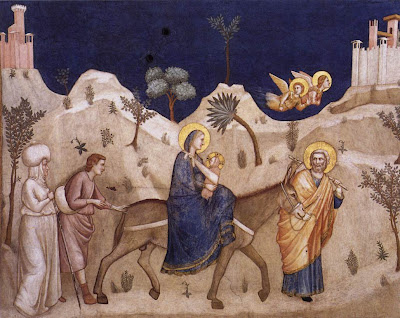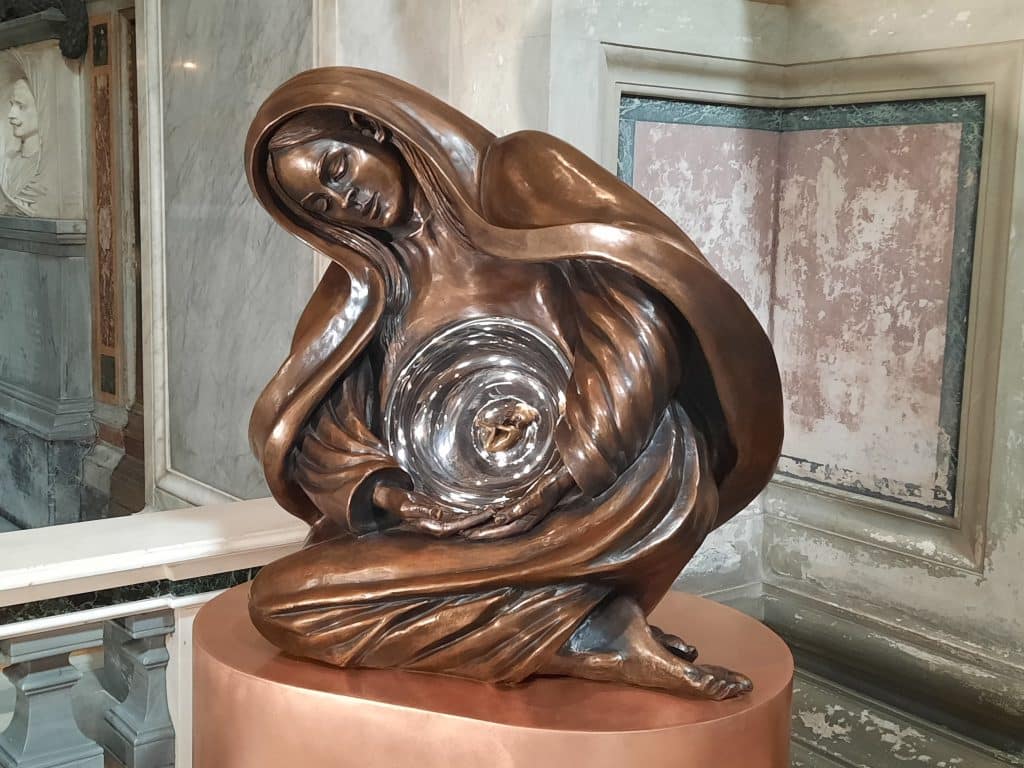This is the fourth post of several posts on Redeemer
in the Womb: Jesus Living in Mary by John Saward.
You can find Post #1 here.
Post #2 here.
Post #3 here.
Chapter 4: Perfection from Conception: The Middle Ages
Kerstin’s Introduction:
The Middle Ages had a deep fascination with Jesus in Mary’s womb. “The
new religious foundations of the Middle Ages—first the Cistercians, later the
Franciscans—excelled in devotion to the humanity of Christ and to the mysteries
of his life on earth, not least its very first months.” They pondered on the
two distinct natures of Christ and how he developed in the womb, the one not
diminishing the other.
From the very moment the Word was made flesh, the Lord Jesus carried his
cross. From that moment he was truly a man of sorrows and acquainted with
grief. We believe the evangelist signified this when he said that “the Word was
made flesh.” By “flesh” he meant the capacity of the flesh to suffer and to
suffer with. For what in all creation is more fragile than flesh, more delicate
than flesh? Fragility, therefore, corresponds to Passion, suffering; delicacy
to Com-passion, suffering-with. From these two, as from two planks, Christ’s
cross is constructed. For to suffer and to suffer with, as St. Gregory says, is
Christ’s true cross, namely, affliction of body and compassion of mind,
provided such a cross is borne for Christ and following Christ. Christ carried
this kind of cross from his entry into his Mother’s womb. He endured the
confines of the virginal womb.
The Franciscans
Devotion to the infancy of Christ, including his first nine months of
life, is one of the pillars of Franciscan spirituality. […] Of the Virgin’s
womb, he says it is a temple made by the Father’s power, adorned by the wisdom
of the Son, dedicated by the grace of the Holy Spirit, and filled by the
presence of the Word made flesh to be his “special temple and hospice.”
St. Thomas Aquinas
…the monastic theologians of the twelfth century, following the Fathers,
readily attributed the fullness of the grace of the Holy Spirit to the soul of
Christ from his conception. […] The embryonic Christ is holy, the holy of
holies, and at the same time he is hallowing; his grace is intended to overflow
to others. The personal grace by which Christ’s soul is sanctified is really
identical with the grace that makes him Head of the Church, sanctifying others.
[…] The loving knowledge with which the divine Redeemer has pursued us from the
first moment of his Incarnation surpasses all the powers of the human mind; for
by means of the beatific vision, which he enjoyed from the time he was received
into the womb of the Mother of God, he has forever and continuously had present
to him all the members of his Mystical Body and embraced them with his saving
love.
Some modern theologians cannot handle these writings. The abilities
attributed to the infant Christ do not coincide with human development in the
womb and early childhood. What modern man fails to see is the ability of the
child to perceive God uninhibited.
In every little one of the human family there are hidden spiritual
depths to which modern Western culture, materialistic and mechanistic,
contra-life and contra-child, blinds the eyes of the mind. If God-made-man is
true and perfect man, we should expect there to be capacities realized in his
childhood that in us remain mostly dormant.
Mother of the Eucharist
The same body of Christ that the most blessed Virgin brought forth,
which she nourished in her womb, wrapped in swaddling clothes and brought up
with motherly care: this same body, I say, and none other, we now perceive
without any doubt on the sacred altar.
If you believe that flesh to have been created from the Virgin MaMary in the
womb without seed by the power of the Holy Spirit, so that the Word became
flesh, truly believe that this body taken from the Virgin is confected [in the
Eucharist] by the word of Christ and through the Holy Spirit.
You, Mary, are Mother of the Eucharist, because you are Mother of Grace. . . .
If, with your mercy and help, we receive your Son in the Sacrament of the
Eucharist, he will surely receive us and incorporate us into his Mystical Body.
###
My Comment:
Short Summary: Meditations on Mary’s carrying of Jesus in the womb from
the Medieval theologians.
The contrast of the nature of Christ’s intellect of St. Bernard of
Clairvaux with that of the scholastics is interesting. St. Bernard postulates:
Even while he was still unborn, Jesus was a man, not in age, but in
wisdom, in vigor of mind, not of body, in the maturity of his mental powers,
not in the development of his members. For Jesus was not less wise, or rather I
should say was not less Wisdom, at his conception than after his birth, when he
was a little one than when he was full-grown. Whether he was lying hidden in
the womb or wailing in the manger, whether as a growing lad questioning the
doctors in the Temple or as a man of mature age teaching among the people, he
was in truth equally full of the Holy Spirit.
Here he is postulating that Jesus had the wisdom, and, therefore, mind
of a grown man even while a fetus in the womb.
I think St. Bernard failed to realize—at least in this passage; Saward
goes on to say Bernard elsewhere acknowledged Christ’s human nature—that though
Christ has a God side to His nature, he also has a developing human nature.
If this monastic theology has a shortcoming, it is its failure to state
explicitly what Scholastic theology will later explain: there can be growth at
one level of Christ’s human knowledge and an abiding fullness at another. In
the century after St. Bernard, St. Thomas Aquinas will confess that
he himself “advanced in wisdom” on the subject of Christ’s “advance in wisdom”
and came eventually to attribute a real acquired (experimental) knowledge to
Christ.
I have always found this hard to keep straight myself. Christ as one person had one mind but He has
two natures, a human nature and a divine nature. As one person, He has one brain but that
brain develops as a human develops and so has the knowledge of comparable human
at a given age, but that one brain has a divine nature and functions as the
omniscient knowledge of God. I hope I
got that right. Someone correct me if I
didn’t.
Michelle’s Reply to My Comment:
I think that's what was meant, although I somehow left this section with
the impression that although omniscient, He chose to bring the human nature to
the forefront. He could access His divine nature at will, but wanted to live
fully as a human, even while in His mother's womb.
Now someone please also correct me if I got that wrong!
My Reply to Michelle:
LOL, I think we're saying the same thing. :)
###
My Comment:
The one thing I found interesting in the scholastic section was St. Thomas Aquinas’ notion that the fetus Jesus was able to see the beatific vision in the womb despite His human development not being sufficient.
Some modern theologians are embarrassed by this view of Christ’s
prenatal perfections. They imagine it makes his humanity, if not unreal, at
least incredible. Psychology, they argue, has shown that mental development
from infancy to adulthood is intrinsic to human life, so that a child already free,
already in the bliss of man’s final destiny, would hardly seem to count as a
child. He would be a sad infant prodigy, robbed of his childhood. In my
opinion, however, St. Thomas’ doctrine of Christ’s “perfections from
conception” has much to teach us. It affirms truths about infancy and thus the
unborn Infant God to which modern minds have grown oblivious.
To the criticisms of recent writers, St. Thomas would answer that
whatever graced the unborn Christ Child perfected, but did not destroy, his
real unborn human childhood. He quotes St. Leo the Great with approval:
apart from the virginal manner of his conception and birth, the Child Jesus is “in
no way dissimilar to the generality of human infancy.” The marvels of the
extraordinary ‘beatific knowledge’ at his soul’s summit (superior pars animae)
do not rob its lower slopes of their precious ordinariness. The Child Jesus is
both “pilgrim” and “beholder.” He sees the Father in a childlike way. The One
whom he sees and the sublime act of his human intellect by which he sees him
are unchanging, but how that seeing bears upon the rest of his human experience
depends on the stage of life in which he finds himself. Likewise, the knowledge
“infused” by the Holy Spirit into his “possible” (receptive) intellect does not
interfere with the normal process of growth in knowledge through the operation
of his “agent” intellect. St. Thomas’ doctrine of Christ’s human knowledge
does not lead to the ridiculous conclusion that, in his Mother’s womb, the Holy
Child “was thinking about the theorems of hydrodynamics and the Battle of
Hastings.” The infused knowledge is habitual, not actual: it is a store on
which our Lord can draw when he has the need, not an instrument he is
perpetually exercising.34 In the womb, he is not engaged in the adult business
of thinking at all. He is doing something much more important: in the earthly
paradise of his Mother’s body, he is resting and seeing, loving and praising,
God his heavenly Father.
So what did Jesus think about in the womb? According to Aquinas He was contemplating the Father “in a childlike way, “infused” by the Holy Spirit. But it does not interfere with His human development! How? I cannot conceptualize it…lol.
Kerstin’s Reply to My Comment:
I had difficulties with this part as well. It is hard enough to conceptualize the hypostatic union for the adult Jesus.
My Reply to Kerstin:
Yes!
Michelle’s Reply:
I don't feel as stupid now. We all had trouble here 😀
Michael’s Reply:
Manny wrote: "So what did Jesus think about in the womb?"
A stunning question. What did Jesus think
about? Not only in the womb, but always, in his days. While working, while
walking, while observing others, or his Mother. I'd never thought 'bout this
and had missed this point in reading the book. I'll prob be thinking about it
all day.
My Reply to Michael:
You know, when I wrote that I didn't realize the profundity of the question. And your expansion of the thought is even more profound. I can't even imagine how to answer it.
Michelle’s Reply to Michael:
These thoughts are superb, Michael. You just gave me more to think about, in a good way.
My Comment:
So what did Jesus think about in the womb? According to Aquinas He was contemplating the
Father “in a childlike way, “infused” by the Holy Spirit. But it does not interfere with His human
development! How? I cannot conceptualize it…lol.











